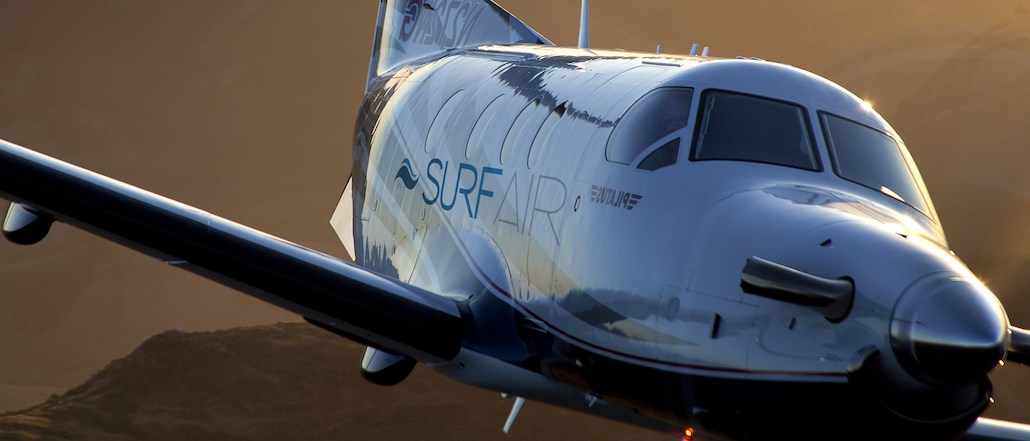
Simon Talling-Smith masterminded British Airways’ first e-commerce site back in 2001. At BA.com, he witnessed a rapid evolution of consumer habits in an industry that, according to PricewaterhouseCoopers, now sees 60 percent of holidays booked online. Travelers are more demanding than ever before.
“It’s about self-service,” he said. “People want more control to book things themselves and get on with it. They don’t want to wait in line.”
Now he’s bringing that insight to Surf Air, the airline app Talling-Smith joined last year.
The company’s premise is a simple one: Offer execs a monthly membership which lets them fly as much as they want for a $1,950 fee (plus a $1,000 sign-up cost). Booking takes 30 seconds, while boarding takes 15 minutes.
“There are a significant number of people travelling frequently between two cities who are fed up with the long waits. The big airports have become victims of their own success,” Talling-Smith said.
The service, which launched in California three years ago, has over 3,000 frequent flyers on the books who travel between 12 small airport terminals in the state. Starting in October, they’ll also be able to fly on three aircrafts servicing the cities of London, Zurich, Geneva, Dublin and Cannes following the launch of Surf Air Europe.
It’s a niche product. Surf Air relies heavily on word-of-mouth marketing: It doesn’t need to be a household name, just discussed in the right households. As such, its marketing begins right in Surf Air’s seven-seater planes, which act as a high-altitude members club for its C-suite execs. But it’s rolled out further with referral programs, the airline’s biggest channel of growth.
The company also has partnerships with concierge companies like Uber, who share information about users who split their time between two cities. These users are then targeted with a joining offer.
“Every frequent traveller we meet says it’s a no-brainer because it’s going to make my so much easier. It’s about finding channels and partners that link us to those people,” Talling-Smith said.
But Surf Air isn’t the only one eyeing the on-demand model. There are rivals like Jay Z-backed JetSmarter, which spent a seven-figure sum on TV ads in a promotional push earlier this year.
Members of Surf Air’s founding team launched an east coast rival service, Beacon, though that shuttered in April.
Bigger airlines haven’t been keen since the now mythical $250,000 lifetime “AAirpass” of American Airlines, which the company released in the 1980s, only to ditch it soon after realizing what a money-losing gambit it was. Flyer Steven Rothstein, one of only 66 with the pass, had his revoked to much furor in 2012.
“In my experience big airlines find it hard to offer all-you-can-fly products because their whole business model runs along optimising fares on every plane,” Talling-Smith said.
Having shaped BA’s online bookings system, Talling-Smith later wore various other hats in the business: During his tenure as head of product management, Talling-Smith oversaw the development of the first fully-flat business class bed and the opening of the airline’s API to developers.
Later, he helped BA get smarter with the data it took from its passengers with its “Know Me” program. That allowed cabin crew to greet frequent flyers as they boarded its planes and to better understand their personal history with the brand.
He also helmed BA’s joint business agreement with Iberia and American Airlines, which opened new routes in the Americas and allowed customers to share their frequent flyer points across the three airlines.
He left in 2013 for a two-year stint at Silicon Valley deals site TravelZoo, where he revived search engine Fly.com.
Europe’s short-haul flights present a “significantly bigger” market for frequent flyers than California alone. Talling-Smith expects to launch the service with 300 European members, with a target of 1,000 by next year.
As with any travel operator, Brexit looms large. However, as Swiss partner Tag Aviation operates Surf Air’s planes, regulation won’t be much different.
More in Marketing

WTF are tokens?
When someone sends a prompt or receives a response, the system breaks language into small segments. These fragments are tokens.

AI is changing how retailers select tech partners
The quick rise of artificial intelligence-powered tools has reshaped retailers’ process of selecting technology partners for anything from marketing to supply chain to merchandising.

YouTube’s upmarket TV push still runs on mid-funnel DNA
YouTube is balancing wanting to be premium TV, the short-form powerhouse and a creator economy engine all at once.





